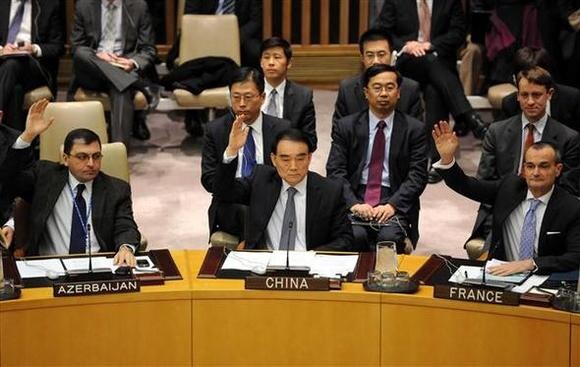hankyoreh
Links to other country sites 다른 나라 사이트 링크
US and China butting heads over North Korea

By Park Hyun and Park Min-hee, Washington and Beijing correspondents
The US and China clashed once again at a Feb. 12 emergency meeting of the UN Security Council, this time over the wording of a statement denouncing North Korea's third nuclear test.
Observers are predicting a rocky road ahead as the two sides try to bridge their differences over additional sanctions.
According to Feb. 13 reports in Foreign Policy magazine and accounts from diplomatic sources, Susan Rice, the US ambassador to the UN, made a proposal early in the meeting for a UNSC resolution on a "swift, credible, and strong" response to prevent North Korea from making further progress with its nuclear and ballistic missile programs. The draft text submitted at the meeting described the nuclear test as a "clear threat to international peace and security" and included a recommendation that the resolution be based on Chapter VII of the UN Charter. This chapter would have to be invoked for the resolution to have any real binding force on a member nation. Chapter VII includes Article 41 on non-military action and Article 42 on military action. A resolution referring to Chapter VII is rare due to these two articles, which are binding for member states.
The move prompted immediate objections from Chinese deputy ambassador Wang Min, who was attending in lieu of ambassador Li Baodong, who is traveling on official business.
Prefacing his remarks by saying that China was sternly opposed to North Korea's actions, Wang stressed the importance of North Korea's denuclearization. However, he also argued in favor of resolving the matter through dialogue, saying the nuclear test did not pose a threat to international or regional peace and stability.
This has been China’s go-to argument when defending North Korea before the UN. If it accepted the idea of the test as a threat to peace and stability, it would have to accept the calls for firmer sanctions.
Rice responded by reading out a portion of a statement in which North Korea announced its plans to conduct a nuclear test, noting that it described the test as targeting the US. She went on to ask whether China did not construe this as being a threat to international peace.
The two countries finally reached a compromise leaving the phrase "clear threat to international peace and security" in the draft but removing the reference to Chapter VII of the UN Charter.
The US and China also clashed at a meeting in December just after North Korea's long-range rocket launch, when Li responded to Rice's characterization of it as harmful to regional stability by arguing that it was not a threat. Rice called this "ridiculous," prompting a bristling Li to tell her to be careful about her language.
The process leading up to Resolution 2087 was a tortuous one, but analysts saw the end result as stronger than expected. Pyongyang responded to it by blasting Beijing for agreeing to sanctions.
While it is still too early to say for certain, many experts are predicting that China may approach the new resolution more cautiously after North Korea's previous response. Speaking to Britain's Guardian newspaper, Shi Yinhong, professor at Renmin University in Beijing, said, "In the last 10 years, China has felt frustrated about the North's behavior many times and will have concluded from Kim Jong-un's behavior that he is even more volatile and provocative than his father."
However, he went on to say that he did not think China would abandon North Korea.
"It will probably support new sanction resolutions but not as strong as the US" would like, he said.
Please direct questions or comments to [english@hani.co.kr]

Editorial・opinion
![[Column] Season 2 of special prosecutor probe may be coming to Korea soon [Column] Season 2 of special prosecutor probe may be coming to Korea soon](https://flexible.img.hani.co.kr/flexible/normal/500/300/imgdb/original/2024/0426/3317141030699447.jpg) [Column] Season 2 of special prosecutor probe may be coming to Korea soon
[Column] Season 2 of special prosecutor probe may be coming to Korea soon![[Column] Park Geun-hye déjà vu in Yoon Suk-yeol [Column] Park Geun-hye déjà vu in Yoon Suk-yeol](https://flexible.img.hani.co.kr/flexible/normal/500/300/imgdb/original/2024/0424/651713945113788.jpg) [Column] Park Geun-hye déjà vu in Yoon Suk-yeol
[Column] Park Geun-hye déjà vu in Yoon Suk-yeol- [Editorial] New weight of N. Korea’s nuclear threats makes dialogue all the more urgent
- [Guest essay] The real reason Korea’s new right wants to dub Rhee a founding father
- [Column] ‘Choson’: Is it time we start referring to N. Korea in its own terms?
- [Editorial] Japan’s rewriting of history with Korea has gone too far
- [Column] The president’s questionable capacity for dialogue
- [Column] Are chaebol firms just pizza pies for families to divvy up as they please?
- [Column] Has Korea, too, crossed the Rubicon on China?
- [Correspondent’s column] In Japan’s alliance with US, echoes of its past alliances with UK
Most viewed articles
- 1‘We must say no’: Seoul defense chief on Korean, USFK involvement in hypothetical Taiwan crisis
- 2N. Korean delegation’s trip to Iran shows how Pyongyang is leveraging ties with Moscow
- 3‘Weddingflation’ breaks the bank for Korean couples-to-be
- 4Korea sees more deaths than births for 52nd consecutive month in February
- 5[Editorial] New weight of N. Korea’s nuclear threats makes dialogue all the more urgent
- 6[Column] Park Geun-hye déjà vu in Yoon Suk-yeol
- 7[Column] Has Korea, too, crossed the Rubicon on China?
- 8[Guest essay] The real reason Korea’s new right wants to dub Rhee a founding father
- 9Will NewJeans end up collateral damage in internal feud at K-pop juggernaut Hybe?
- 10Why Korea shouldn’t welcome Japan’s newly beefed up defense cooperation with US